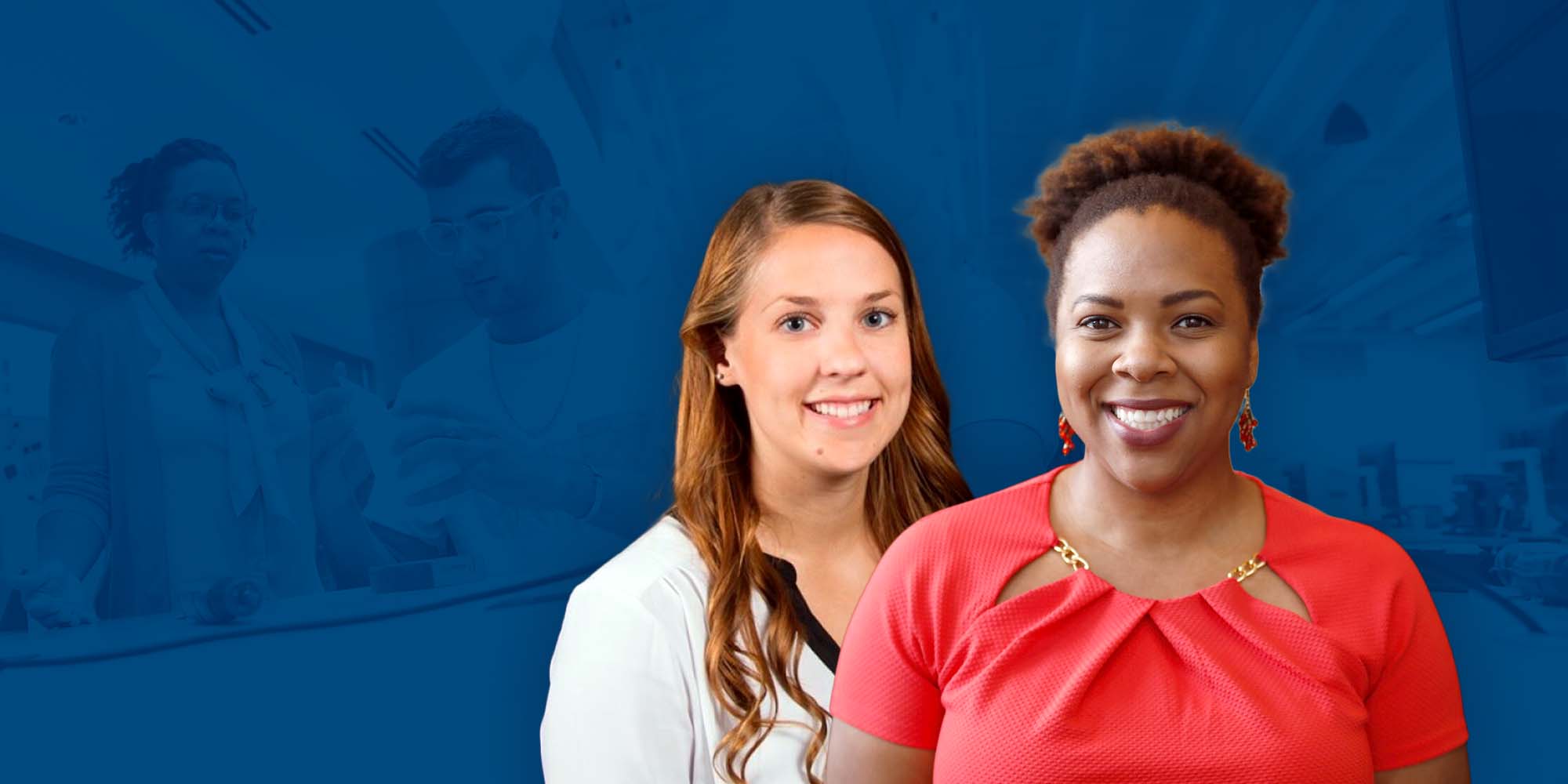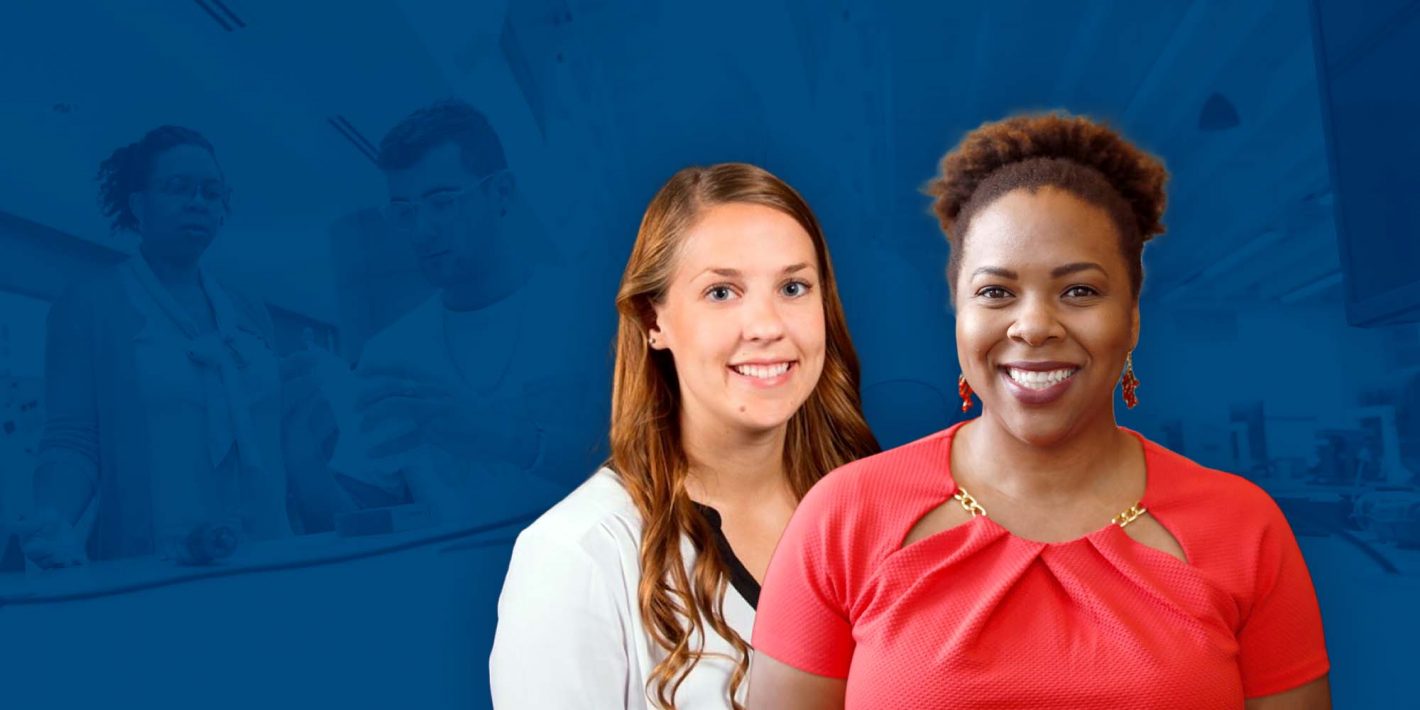
L-R: Amie Baisley, Ph.D., instructional assistant professor in EED, and Jeremy A.M. Waisome, Ph.D., assistant professor in EED
Thomas O. Hunter, Ph.D. (BS ME ’66) is passionate about the future of engineering and the dedicated faculty that educate the engineers of tomorrow. Dr. Hunter recently made an investment in the Herbert Wertheim College of Engineering’s Department of Engineering Education by establishing the Thomas O. Hunter Professorship, which is the first named professorship for the department and the first time an individual has gifted a faculty endowment to the department.
“These professorships are highlighting one of the key visions of the Department of Engineering Education, which is ‘to create the global leaders and problem solvers of tomorrow’,” said Hans van Oostrom, Ph.D., EED chair. “Through innovations in curriculum and teaching, students can reap the benefits by being prepared for any of the problems they are given to solve.”
Dr. Hunter is a member of the engineering Dean’s Advisory Board and chair of the Engineering Leadership Institute Advisory Board at UF. He spent his entire career at Sandia National Laboratories, retiring in July 2010 as president and Laboratories Director. He joined Sandia in 1967 and became president in April 2005. His responsibilities included managing the Laboratories’ $2.3 billion annual budget and approximately 8,400 employees.
Dr. Hunter earned a B.S. in mechanical engineering from the University of Florida, an M.S. in mechanical engineering from the University of New Mexico, an M.S. in nuclear engineering from the University of Wisconsin, and a Ph.D. in nuclear engineering from the University of Wisconsin. He was recognized as a distinguished alumnus by both the University of Florida and the University of Wisconsin.
Funding the Educators of Tomorrow
Dr. van Oostrom named Jeremy A. M. Waisome, Ph.D., an assistant professor, and Amie Baisley, Ph.D., an instructional assistant professor, as recipients of the professorships in recognition of their contributions to the field of engineering education.
Jeremy A.M. Waisome, Ph.D.
Assistant Professor
This professorship will support Dr. Waisome’s research in the area of problem-solving. During her postdoctoral experience with Dr. Elliot Douglas, she began working on research related to problem-solving in engineering education. The researchers set out to determine what ambiguity meant to novice and professional civil engineers in the context of problem solving in their discipline. They intend to use their findings to improve curriculum development to better address issues of ambiguity experienced in the workforce.
“There is an age-old adage that ‘engineers solve problems’,” Dr. Waisome said. “But this phrase is without the much-needed context we want our engineering students to take into the workforce. We solve problems for people, with people. And that means we need to be doing research on the implications of these factors.”
Dr. Waisome’s research broadly focuses on understanding, highlighting and improving the experiences of those historically underrepresented populations in engineering and computing.
“Receiving this professorship encourages me to continue working towards enhancing students’ engineering education experience through my research,” Dr. Waisome said. “I plan to use the support to focus on the importance of peer mentorship in engineering, specifically as it relates to problem-solving.”
“I consider myself an interventionist,” she said. “I design studies that incorporate tenets of critical mentorship and self-efficacy, or one’s belief in their ability to accomplish a goal/task, to help individuals thrive in engineering and computing.”
Amie Baisley, Ph.D.
Instructional Assistant Professor
Dr. Baisley was awarded this professorship to support her work in teaching fundamental courses and her research in assessment of mastery and persistence to better understand student misconceptions in the engineering mechanics courses and to better track their learning of the material.
“The courses I teach are second-year engineering courses, which can be a challenging time for students who feel as if they are going through ‘weed out’ courses,” Dr. Baisley said. “But part of my research is focused on better understanding the reasons students feel this way about engineering and what academic factors can influence the decision to persist in engineering or not.”
Dr. Baisley’s research focuses on three areas: the use of alternative teaching and grading methods; student persistence in engineering; and equitable evaluation and professional development for teaching in engineering. Dr. Baisley said the combination of the three areas works to improve instructional activities for undergraduate engineering students by considering several different influences on the students, including the course design, the student perspective and a faculty member’s teaching style.
“The courses I teach are a bridge between the math and science prerequisites for engineering students and the design and application courses the students take later on, so I have focused on the development of an environment that actively engages the students and better understands their learning of the concepts to help promote persistence in engineering,” Dr. Baisley said.
